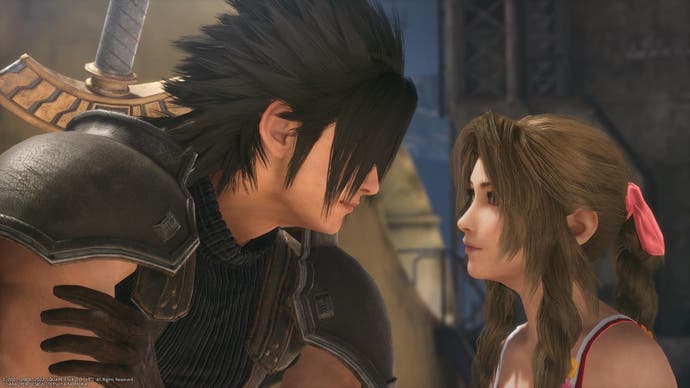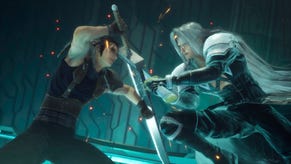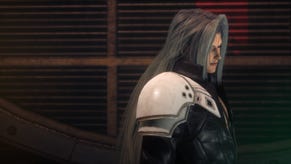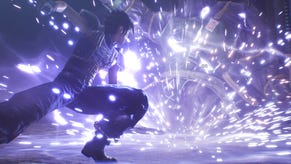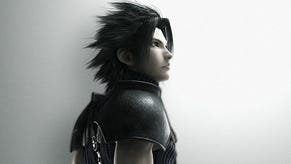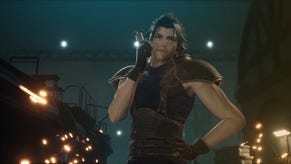Crisis Core Final Fantasy 7 Reunion review - enjoyably frivolous fan service with curious implications
Source materia.
Those soft, eerie strings. The tinkling glockenspiel motif. The camera pans out to show the formidable Shinra corporation building towering over the polluted slums of Midgar, illuminated in sickly greens. The hero arrives on a train and another Final Fantasy 7 adventure begins.
It's a familiar opening for Final Fantasy 7 fans, especially those coming to Crisis Core for the first time, who are yet to experience the PSP prequel to Square Enix's most popular game in its illustrious series but eager to explore this world once more.
And plenty of fans have been gained over the two and a half decades since Final Fantasy 7 released on the PlayStation. It means that now, Crisis Core Final Fantasy 7 Reunion (what a mouthful) has a fair bit of heavy lifting to do, as a 2022 remaster of a 2007 prequel to a 1997 game that received a celebrated Remake in 2020. It's for fans of the original PSP game looking for an update. It's for fans of the original JRPG looking for an expanded story. And it's for fans of Remake looking to experience the game's roots - and perhaps even a hint of what's yet to come.
I can only speak for two of these three, having not played Crisis Core before, but I, as with many fans, am very happy that Square Enix is finally making the game more widely available - and I can safely say that fans will not want to miss this. Crisis Core Final Fantasy 7 Reunion is a somewhat frivolous game, but it's also a fun one. One that not only reinvigorates the PSP prequel, but legitimises its existence to Final Fantasy 7 and to Remake with newfound cohesion.
To give some context to the newcomers, Final Fantasy 7 is a story about eco-warriors preventing a corrupt corporation from destroying the planet, but its latter half focuses on the skewed memories of lead character Cloud. Crisis Core delves into that game's twist (no, not that one) to deliver further backstory on Cloud's origins, leading directly into the events of the original and its exploration of identity - though I'll say no more for fear of spoiling the plot of three different games.
Cloud does feature in Crisis Core, but Zack Fair is the protagonist - a plucky, overeager, puppydog member of Shinra's special forces SOLDIER with a curious urge to squat when he's stressed. And over the course of the plot, we also learn more about Shinra's inner corruption and the downfall of antagonist Sephiroth.
It's pure fan service, but in the process it takes a flashback from the original and weaves it into a new story: introducing new characters, reintroducing old ones, and trying to make sense of some nonsense about cloning, weird experiments, and a theatre production. While initially intriguing and full of dramatic irony, it's all a bit unnecessary. Zack's story didn't need telling in this detail, and the additional characters here bring little to the overall Final Fantasy 7 saga. Zack is a likeable character, but the game expands upon what never really needed expanding - if anything, Crisis Core over-explains the original plot to the point of cheapening it, undermining its subtle ambiguity.
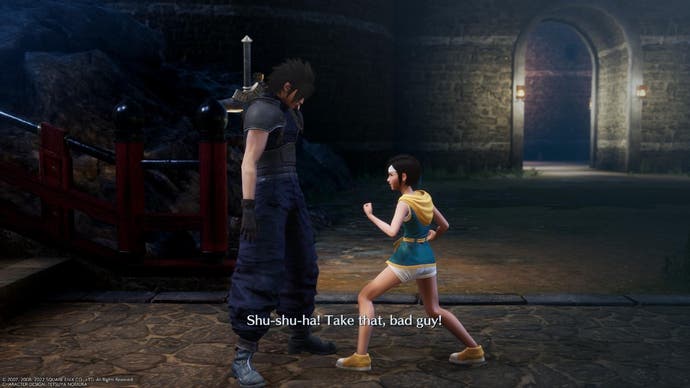
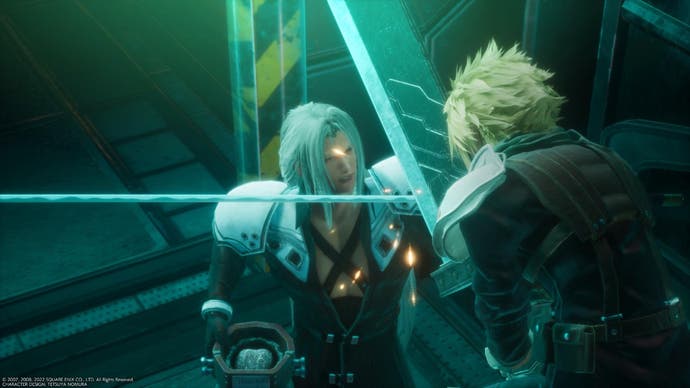
That's not to say Crisis Core isn't fun, though, and anyone who's played the PSP game will be aware of plot flaws. If you put those aside, Square Enix has delivered a sensitively modernised remaster that, story aside, improves on the original hugely. This feels like the definitive way to experience Crisis Core.
Graphically it's a vast improvement, with updated textures, a gorgeous lighting system, and character models in-line with those from Remake. It's not quite up to the standard of that game - animations remain a little stiff and the lip-synching is noticeably off - but it's clearly now part of the same saga. Menus, fonts, and UI are all taken from Remake, merging these games together into a cohesive whole.
The overhauled battle system is also closer to Remake, given fresh immediacy. Combat occurs in real-time and is particularly satisfying as Zack blocks attacks and dodges behind enemies for a critical strike, and so like Remake, battles feel fast and smooth rather than fiddly, without interruption. Now, for instance, magic and ability shortcuts can be assigned to six buttons accessible with the left bumper. These correspond to collected materia - orbs relating to spells, special moves, and stat buffs - that can be easily swapped to customise Zack to your playstyle.
With use, materia levels up to increase potency. Then it can be fused together to form new ones - two maxed out Fire spells fuse to form the stronger Fira, and so on. This adds to Zack's flexibility, but it also soon results in too many materia and not enough game to make use of them, since Crisis Core's runtime is only around 15 hours. Despite customisation, Zack is the only playable character, which can become repetitive. It makes me wish for another to stop materia gathering dust in a menu somewhere.
.png?width=690&quality=75&format=jpg&auto=webp)
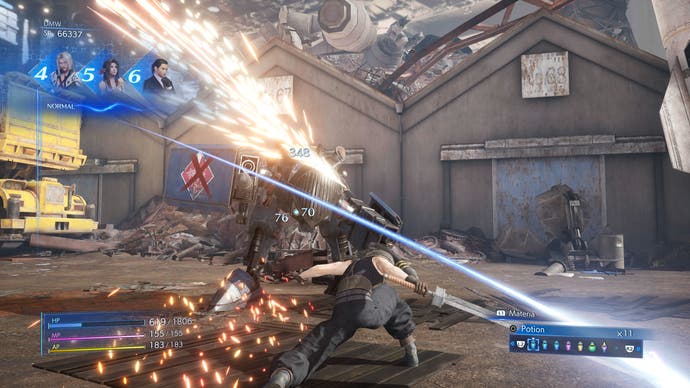
Returning from the original is the most innovative battle feature: the Digital Mind Wave (DMW). This is essentially a roulette in the corner of battle that constantly spins. Certain combinations of numbers will impact battle, from providing unlimited magic power for a short time, to levelling up Zack and his equipped materia. Summons and limit breaks are also tied to this system: the former a welcome relief in combat, the latter connected to Zack's relationships with certain key characters. Now, these moves are triggered by the player rather than automatically, adding some control to the randomness.
The DMW makes up for a lack of party members and even includes extra cutscenes that play into the overarching theme of memory. It also makes battles laughably easy and trivialises bosses - I often found myself simply spamming powerful attacks infinitely thanks to a lucky roulette roll. However, the randomness certainly prevents battles from becoming too stale by putting a spin (sorry) on combat.
There are other improvements in this remaster too, particularly with sound. All cutscenes are now fully voiced: it's cinematic and indicative of Square Enix's high production value. Moreover, voices now match Remake, further mirroring that game's presentation, and the soundtrack has been rearranged to modern standards too. As expected, the orchestrated score is lovely, from that evocative opening to the heavy rock of battle.
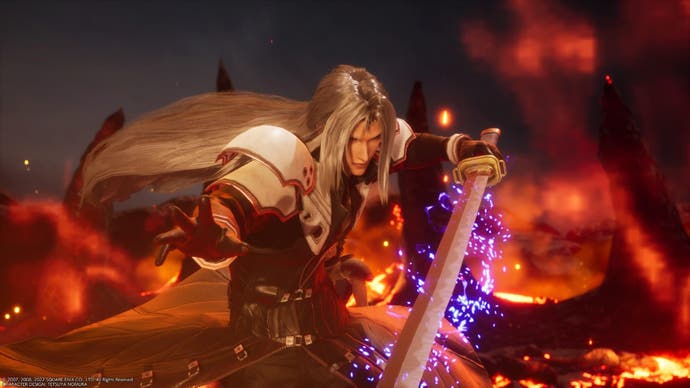
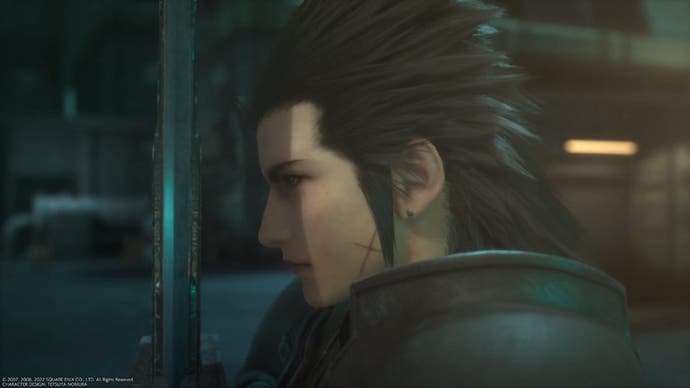
Despite changes, though, Reunion still cannot hide the fact it's a PSP game showing its age - and I don't mean the flip phones. Gameplay is linear, the world comprises multiple small areas with little room for exploration, and it's focused predominantly on combat over puzzle solving. That said, the hyper focus on one character and smaller scale story make a refreshing change from operatic JRPG grandeur.
The PSP hangover continues with the hundreds of extra side missions, accessible at save points. These are tiny, bite-sized missions that require navigating simple labyrinths of repeated assets - environments, enemies, and bosses. They soon become tiresome, but are necessary for levelling up and collecting strong materia.
On the flipside, these missions are often triggered by incoming emails that offer extra insight into the world and emphasise Zack's job as a soldier for hire. What's more, many missions take place outside the walls of Midgar, offering an exciting glimpse of what's to come in Cloud's next adventure. Just be aware that Crisis Core does not have a typical new game plus mode - saving after the credits retains experience and materia, but side mission progress is lost.
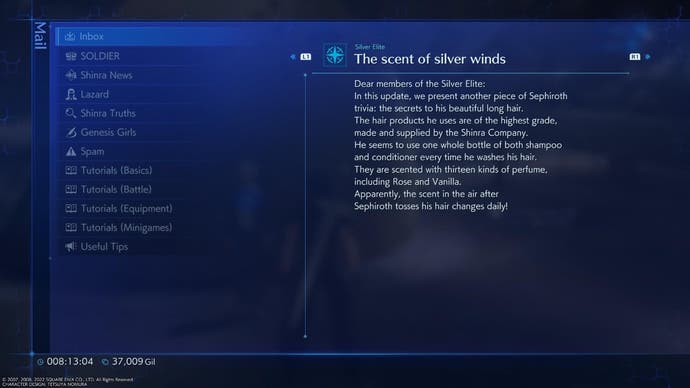
What remains to be seen is the importance of Crisis Core to the plot of Final Fantasy 7 Remake as it returns for part two, Rebirth. The choice to remaster this game at this time reintroduces Zack to a new audience and, I suspect, does suggest greater importance for him in the future. And what might that mean in the context of Cloud as an unreliable narrator, the theme of memory, the changes to the original plot? It's called Rebirth after all. That's certainly an enticing prospect.
Either way, despite something of an overdeveloped plot, Crisis Core Reunion goes beyond just a quick upgrade, making some fundamental improvements to visuals, sound and controls, and implements them with care. There are flaws, but it remains a joy to spend time with favourites Cloud, Aerith, and Sephiroth once more.
